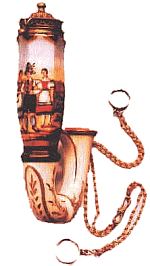 Opening Hours: closed at the moment
Opening Hours: closed at the moment
Guidances for groups possible throughout the year by arrangement with +49 9774 / 92 40 or +49 9774 / 91 91 0
Address:
First German Tobacco Museum
Valentin-Rathgeber-House
97656 Oberelsbach
phone +49 9774 8298
telefax +49 9774 919125
http://www.tabakpfeifenmuseum.de/
{mosmap|lat='50.441849'|lon='10.118295'|zoom='10'|lang='en'}
{mosmap width='100%'|height='500px'|lat='50.441849'|lon='10.118295'|zoom='15'|zoomType='Small'| zoomNew='1'|showMaptype='1'|overview='1'|text='First German Tobacco Museum <br>Rathgeberstraße 4<br>97656 Oberelsbach<br>Germany'|tooltip='Info'}
{mosmap width='100%'|height='500px'|lat='50.441849'|lon='10.118295'|zoom='15'|zoomType='Small'| zoomNew='1'|mapType='Satellite'|showMaptype='1'|overview='1'}
Since October 1996, the First German Tobacco Museum is accommodated in the "Old Schoolhouse" located on a hill next to the parish church and in the middle of the commune of Oberelsbach.
This grand building, visible from everywhere, was erected about 1611 under the aegis of Prince Bishop Julius Echter of Mespelbrunn (reigned 1573-1617) instead of a ruinous predecessor. The "Old Schoolhouse" was renovated and converted to an exhibition building in 1994-1996. This museum surveys the history of smoking in Germany from the 17th century until today.
 Historical tobacco pipes manufactured by German producers and objects of the smoking culture of the 17th-20th century are displayed in nine rooms distributed on two floors.
Historical tobacco pipes manufactured by German producers and objects of the smoking culture of the 17th-20th century are displayed in nine rooms distributed on two floors.
Upstairs is another room dedicated to the heritage of Valentin Rathgeber, the most famous son of the commune of Oberelsbach.
You could find more information on the First German Tobacco Museum here: http://www.tabakpfeifenmuseum.de/
On the following pages you find additional Frankonian composers by religious affiliation.
Fr. Marianus Baal OSB (1657-1701) from Karlstadt (Muensterschwarzach)
4 Motets, 1 Mass, 1 Sonata
Fr. Aemilian Hoenninger OSB (1694-1758) from Koenigshofen/Tauber (Neustadt)
11 Masses
manuscript: 1 Mass
missing: 12 Masses
Fr. Peregrin Poegl OSB (1711-1788) aus Sandau/Bohemia (Neustadt)
32 Antiphons; 21 Masses; 19 Offertories; 6 Sonatas; 6 Vespers; 2 Requiems
manuscript: Offertories; 3 Masses, 1 Hymns, 1 Cantata
Fr. Romanus Schad OSB (1758-1834) from Muersbach (Banz)
manuscript: 2 Hymns „Fracto demum sacramento", 1 Salve Regina
Fr. Stephan Hammel OSB (1756-1830) from Gissigheim (Wuerzburg)
manuscript: 41 Preludes; 3 Masses; 2 Antiphons; 1 Te Deum; 1 Vespers
Fr. Albert Melchior OSB (1662-1727) from Hassfurt (Theres)
Abbot Albericus Ebenhoech OSB (1666-1727) from Eibelstadt (Wuerzburg)
Fr. Meinrad Kaltsch OSB (*1668) from Kitzingen (Muensterschwarzach)
Fr. Amandus Samhaber OSB (*1675) from Gerolzhofen (Muensterschwarzach)
Fr. Wolfgang Erhard OSB (1696-1744) from Sesslach (Banz)
Fr. Wolfgang Tuerkes OSB (1727-1783) from Weingarten (Banz)
Fr. Karl Leim OSB (1755-1824) from Roettingen (Neustadt)
Fr. Carl Klug OESA (1681-1721) aus Miltenberg (Wuerzburg)
Fr. Benedikt Geisler CRSA (1696-1772) from Dettelbach (Triefenstein)
31 Masses, 18 Offertories; 12 Antiphons; 8 Vespers; 6 Litanies
Fr. Franz Xaver Bittheuser CRSA (*1727) from Roettingen (Triefenstein)
6 Sonatas
Fr. Joseph Krafft CRSA (1750-1812) from Marktschorgast (Heidenfeld)
6 Masses
manuscript:
1 Mass
Fr. Bartholomaeus Thenn OCist (*1736) from Bamberg (Ebrach)
manuscript: 1 Salve Regina, evtl. 1 Partita
Fr. Joseph Kueffner OCist (1770-1833) from Wuerzburg (Schoenthal)
manuscript: 2 Masses
Fr. Emanuel Neubert OCist (1679-1720) from Randersacker (Ebrach)
Br. Kilian Roettinger OCist (1739-1794) from Gerolzhofen (Ebrach)
Fr. Godefridus Degent OCist (1719-1788) from Woerth (Bronnbach)
Fr. Placidus Guenther OCist (1731-1803) from Heidenfeld (Bronnbach)
Fr. Norbert Kauth OCist (1734-1801) from Lengfurt (Bronnbach)
The Augustinian Hermit Fr. Coelestin Wuest was born as Balthasar Wuest in Kleinwenkheim on January 30th, 1720 to the couple Georg and Magdalena Wuest. In the years 1737 to 1741 he studied at the Augustinian school in Muennerstadt and was temporarily sacristan and consultor of the student congregation. On October 30th, 1742 he professed to the Augustinian monastery of Muennerstadt. Afterwards he moved to Breisach for studying philosophy. On September 18th, 1745 he was ordained. About the year 1746 he acted as organist in Uttenweiler, before he moved as confessor, preacher and organist to Mainz, where he died already on February 7th, 1761. Wuest was considered as a „Organista celeberrimus“ and „nobilis Organista“ among his confrères.
Catalogue of Works:
manuscript:
Missa solemnis in D and G
Two collections of works by Willkomm have been published in the publishing house Lotter in Augsburg. Both his collections of Arias with the title "Philomela Sacra" (= "Sacred Nightingale") from the years 1730 [RISM W 1217] and 1731 [RISM W 1218] have been probably written for own use in the monsatery of Bildhausen, before they were published. These Arias seem to be rather popular, since there was a second edition of Opus 2 already in the year 1732. It is a debatable point why Willkomm has not published further works until his death especially regarding the great success of his compositions. Besides his printed works there are a few manuscripts that can be attributed to Fr. Eugen..
Catalogue of Works:
48 Arias
manuscript:
6 Salve Regina, maybe 2 Arias
missing:
2 Masses, 1 Offertory
The Augustinian Hermit Fr. Coelestin Will was born in Wuelfershausen on February 26th, 1690 as Johann Georg Will to the blacksmith Petrus Will and his wife Margarete, a daughter of the Ludirector Peter Balling of Eichenhausen. On July 2nd, 1710 he professed to the Augustinian monastery of Muennerstadt. Afterwards he studied philosophy in Wuerzburg and since the year 1712 theology in Constance where he also acted as an organist. On March 17th, 1714 he was ordained and was confessor and organist in Constance at first, but moved soon to the Augustinian monastery of Wuerzburg fulfilling the same duties. Will died in Wuerzburg on August 14th, 1741 at 8pm on fever. He was considered as „Perfectus Organista et Componista“ or „Organista celeberrimus“ among his confrères.
Catalogue of Works:
missing:
2 Masses